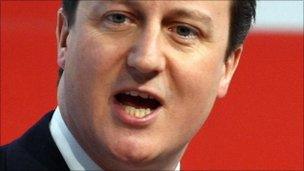David Cameron: Libya action in 'national interest'
- Published

David Cameron had been due to deliver an election rallying call to the Perth conference
Prime Minister David Cameron insisted UK action against Libya is in the "national interest", as he sought to address concerns over the move.
Mr Cameron told the Scottish Tory conference the joint UK, US and French operation had full legal backing.
The move will come after the UN backed a resolution authorising a no-fly zone.
In a reference to the Lockerbie bombing, Mr Cameron said Libyan Leader Col Muammar Gaddafi had a track record of support for terrorism.
Libyan Abdelbaset Ali al-Megrahi is the only person convicted over the 1988 attack, which was the UK's worst terrorist atrocity.
Megrahi, who has terminal cancer, has since been released on compassionate grounds by the Scottish government to return home.
The prime minister had been due to deliver a rallying call to the Perth conference, just weeks before the Scottish Parliament elections in May.
But he chose instead to focus on the situation in Libya, where he said UK warplanes were being deployed to help protect the Libyan people from "brutal" attacks by the Gaddafi regime, as violence in the Middle Eastern country continues.
In response, the Libyan regime said it was calling an immediate ceasefire.
'Huge pressure'
Mr Cameron, said: "If Gadaffi's attacks on his own people succeed, Libya will once again become a pariah state, festering on Europe's border, a source of instability, exporting strife beyond her borders.
"A state from which literally hundreds of thousands of citizens could seek to escape, putting huge pressure on us in Europe."
The prime minister also warned: "We must remember that Gaddafi is a dictator who has a track record of violence and support for terrorism against our country and against Scotland specifically.
"The people of Lockerbie, 100 miles away from here, know what he is capable of.
"I am clear: taking action in Libya is in our national interest and that's why Britain, with our allies like America and France, and alongside the Arab world, must play our part in responding to this crisis."
As well as a no-fly zone, the UN Security Council resolution calls for an immediate ceasefire, a tightening of sanctions against the Libyan regime, and measures to stop Col Gaddafi bringing in foreign mercenaries.
During a speech in which Mr Cameron sought to address public concern over the action, in the wake of the controversial invasion of Iraq in 2003, the prime minister said: "The central purpose of all this is clear - to end the violence, protect civilians and allow the people of Libya to determine their own future, free from the brutality inflicted by the Gaddafi regime."
Mr Cameron continued: "What we are doing is endorsed by the UN, is rooted in international law and will also be subject to full parliamentary scrutiny - that is the right way of doing things."
Armed forces honoured
The prime minister said the move would not be "another Iraq", as he stressed there would be no foreign occupation of Libya, under the terms of the UN resolution.
Following Mr Cameron's course of action - and with the future of RAF bases in Scotland in doubt amid UK spending cuts - the prime minister also paid tribute to armed forced north of the border.
"Here in Scotland, where people have for decades made a disproportionate contribution to our armed services, it is good to be able to say - loud and clear - that we honour and revere all that you are and all that you do," he said.
In what was the first speech by a prime minister to a Scottish Conservative conference since devolution, Mr Cameron made a brief reference to the coming Holyrood election fight, telling the conference "you have my good wishes and full support".